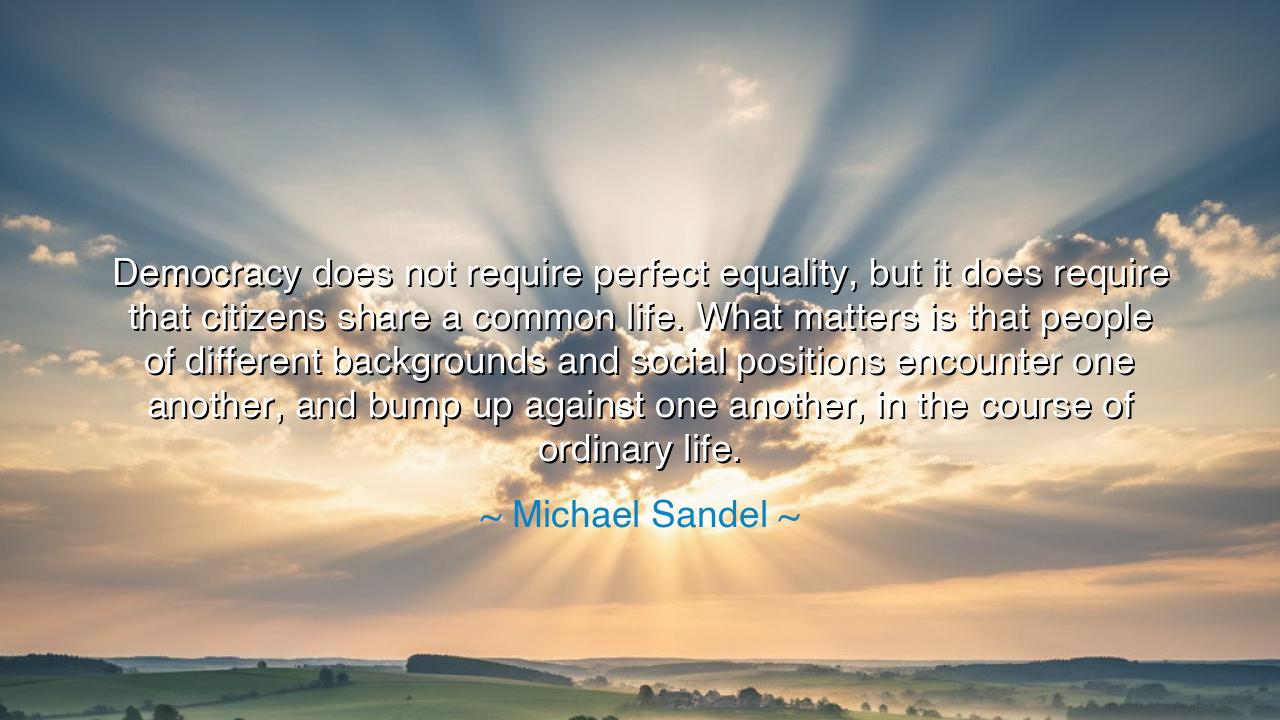
Democracy does not require perfect equality, but it does require
Democracy does not require perfect equality, but it does require that citizens share a common life. What matters is that people of different backgrounds and social positions encounter one another, and bump up against one another, in the course of ordinary life.






“Democracy does not require perfect equality, but it does require that citizens share a common life. What matters is that people of different backgrounds and social positions encounter one another, and bump up against one another, in the course of ordinary life.” Thus spoke Michael Sandel, a philosopher of our own age, yet his words carry the weight of ancient wisdom. For he reminds us that democracy is not merely the casting of ballots or the writing of laws, but the weaving of lives together. It is not perfection of sameness, but the binding of difference into shared experience.
The ancients knew this truth. In the agora of Athens, farmers, craftsmen, nobles, and soldiers all gathered to deliberate. Though not all were granted full citizenship, those who were shared in a common life, speaking face to face, hearing one another’s voices, colliding in disagreement, yet bound together by the city itself. Without this mingling, without this “bumping up” against one another, the polis would have been but a collection of isolated estates, not a living democracy. Sandel’s teaching echoes this: a nation thrives not when all are equal in wealth, but when all are present in the same civic life.
Consider the story of Abraham Lincoln, who as a young man worked on riverboats and split rails before rising to lead a nation. His path forced him to encounter men of different classes, to live among both laborers and lawmakers. In him, the common life was embodied, and thus when he spoke of a “government of the people, by the people, for the people,” his words carried power. For he understood that democracy dies not when riches are uneven, but when citizens cease to meet one another across divides, when each class builds its own walls and ceases to know the other.
Sandel warns us of a danger that grows in modern times: the danger of separation. When the wealthy live in gated enclaves, when the poor are pushed to unseen margins, when work, school, and leisure all divide us by class and background, the encounter that nourishes democracy fades. In its place arises suspicion, resentment, and division. Without shared spaces, without the ordinary mingling of lives, democracy becomes an empty shell—its citizens strangers to one another, its promise hollow.
But the philosopher does not counsel despair. He points to the power of the ordinary life—the markets, the schools, the parks, the streets—where human beings naturally meet and see each other’s faces. These are the sacred spaces of democracy, more vital than parliaments or courts, for here is where empathy is born. To buy bread from one of another faith, to sit beside one of another class, to walk in the same public square—these small acts weave the great fabric of civic unity. It is in these daily collisions that democracy is nourished.
The lesson for us is clear: if we would preserve our freedoms, we must not retreat into islands of comfort and division. We must cultivate the common life, building schools that mix children of every background, creating public spaces where all may gather, supporting institutions that welcome the whole community rather than fragments of it. Let us not imagine that laws alone sustain liberty; it is shared life that breathes spirit into them.
Practical wisdom follows: seek out encounters across difference. Do not dwell only among those who mirror your wealth, your belief, your appearance. Speak to the stranger, work alongside the overlooked, live in such a way that your life touches those unlike yourself. Build not only private success, but public bonds. For when we meet each other in daily life, we remember that beyond class and creed, we are fellow citizens, entrusted with the same destiny.
Thus Sandel’s words, though spoken of democracy, speak to the soul of all community. Perfect equality may be beyond our reach, but shared life is within our grasp. Let us, then, choose it deliberately, so that democracy may endure not as an abstraction, but as a living covenant, binding the many into one people. In the marketplace, in the square, in the home, let us “bump up” against one another, and in doing so, rediscover the sacred truth: that a people divided is a people undone, but a people living a common life is a people eternal.






AAdministratorAdministrator
Welcome, honored guests. Please leave a comment, we will respond soon